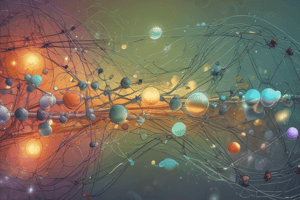Podcast
Questions and Answers
What happens to energy during the breaking of bonds between atoms?
What happens to energy during the breaking of bonds between atoms?
- Energy is absorbed (correct)
- Energy remains constant
- Energy is converted into mechanical energy
- Energy is released
Which type of reaction involves the combination of two or more reactants to form a single product?
Which type of reaction involves the combination of two or more reactants to form a single product?
- Decomposition reaction
- Synthesis reaction (correct)
- Endothermic reaction
- Exothermic reaction
What is the primary source of energy in the human body?
What is the primary source of energy in the human body?
- Mechanical energy
- Chemical energy (correct)
- Thermal energy
- Electrical energy
Which type of reaction requires an input of heat to proceed?
Which type of reaction requires an input of heat to proceed?
What is the process by which a battery supplies electrical energy?
What is the process by which a battery supplies electrical energy?
Which statement best describes energy transfer in chemical reactions?
Which statement best describes energy transfer in chemical reactions?
Which type of reaction involves a single reactant breaking down into two or more products?
Which type of reaction involves a single reactant breaking down into two or more products?
Which type of reaction is represented by the following equation: H2(g) + Cl2(g) → 2HCl(aq)?
Which type of reaction is represented by the following equation: H2(g) + Cl2(g) → 2HCl(aq)?
What is the role of a catalyst in a chemical reaction?
What is the role of a catalyst in a chemical reaction?
What are the products of the decomposition of a metal carbonate?
What are the products of the decomposition of a metal carbonate?
Which statement about chemical reactions is true?
Which statement about chemical reactions is true?
What is the importance of understanding chemical reactions?
What is the importance of understanding chemical reactions?
Flashcards are hidden until you start studying
Study Notes
Chemical Energy: Understanding Energy Transfer in Chemical Reactions
Chemical energy is a type of potential energy that is stored within the bonds of chemical compounds. This energy can be released during a chemical reaction, often in the form of heat, and such reactions are called exothermic. Conversely, reactions that require an input of heat to proceed may store some of that energy as chemical energy in newly formed bonds.
Chemical energy is crucial in our daily life, from the food we eat to the power we use. For example, the chemical energy in food is converted by the body into mechanical energy and heat, while the chemical energy in coal is converted into electrical energy at a power plant. Similarly, the chemical energy in a battery can supply electrical power by means of electrolysis.
Energy Transfer in Chemical Reactions
Energy transfer in chemical reactions occurs when the bonds between atoms are broken or formed, releasing or absorbing energy. Breaking the bonds between atoms requires energy, while forming new bonds between atoms releases energy. This energy transfer is a fundamental aspect of chemical reactions, and understanding it is essential for utilizing chemical energy effectively.
Types of Chemical Reactions
There are two main types of chemical reactions: synthesis (also known as combination) and decomposition.
Synthesis (Combination) Reactions
In synthesis reactions, two or more reactants combine to form a single product. For example, when hydrogen gas (H2) reacts with chlorine gas (Cl2) in the presence of a catalyst, they form hydrochloric acid (HCl). This reaction can be represented as:
H2(g) + Cl2(g) → 2HCl(aq)
Decomposition Reactions
In decomposition reactions, a single reactant breaks down into two or more products. For example, when a metal carbonate is heated, it decomposes into a metal oxide and carbon dioxide. This reaction can be represented as:
MCO3(s) → M(s) + CO2(g)
Understanding these types of reactions is crucial for managing chemical energy effectively, as it allows us to predict the outcome of a given reaction and determine the energy balance between the reactants and products.
In conclusion, chemical energy is a vital component of our daily life, and its transfer in chemical reactions is a fundamental aspect of chemistry. By understanding the types of chemical reactions and the energy transfer involved, we can effectively utilize and manage chemical energy for various purposes.
Studying That Suits You
Use AI to generate personalized quizzes and flashcards to suit your learning preferences.




